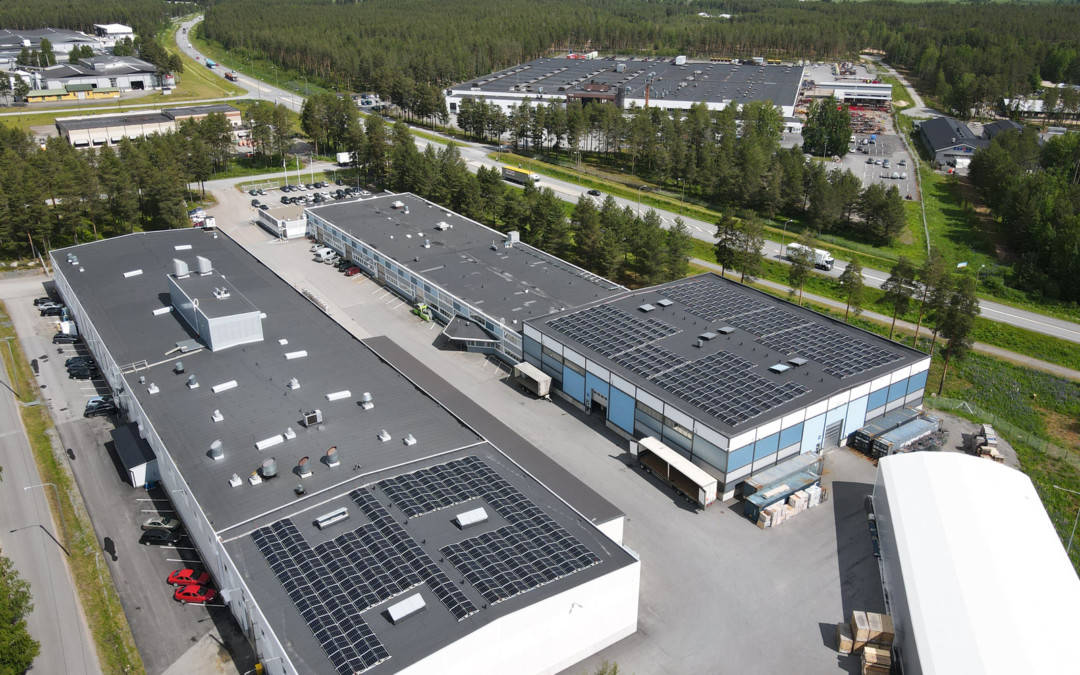In the summer of 2022, a solar power plant with more than 1000 solar panels will be commissioned at MSK Plast’s Ylihärmä factory. It will provide renewable energy for producing plastic parts for the factory for the next 35 years. Around 4% of the factory’s electricity consumption will be covered by solar power. This figure is equivalent to the electricity consumption of 16 single-family homes, for example.
– The investment had been on our agenda for probably ten years. We waited for the right time and monitored the development of the panels and the energy yield concerning the surface area. Later, we realised that the technology has advanced enough to achieve a good enough efficiency,” says Jaakko Lipponen, Managing Director of MSK Plast, explaining the investment.
During the weekends, the factory hardly uses any electricity. So if the weather is sunny, the factory can release the CO2-free electricity produced by the panels into the grid for other electricity users.
– We are then also a small producer of CO2-free electricity.
The solar power plant installed at the factory consists of three-panel fields. Two panel fields are located on the factory roof, and one is made on the ground in front of the factory building. Solarigo Systems Oy, a local company, supplied the solar power plant.
– We are delighted that MSK Plast is working with us and wants to implement a solar power plant of significant size on their property. More than 1000 solar panels is a substantial commitment to renewable energy, says Markus Puoskari, Marketing Coordinator at Solarigo Systems.
Industrial customers are enthusiastic about green energy. The solar power plants installed by Solarigo range from 100 kilowatts to tens of megawatts. Some customers invest in their power plants, while others buy electricity.
– So in these cases, we invest and build the solar power plant on or near the roof of the customer’s property, and the customer signs a power purchase agreement with us,” Puoskari says.
Group values and actions
One of MSK Group Oy’s values is responsibility, which is reflected in concrete actions.
– For example, in 2020, all domestic factories were switched to emission-free electricity produced with wind power. In 2023, we committed to using only biodiesel in our fuel-powered trucks.
– The Sustainability Report is one of the most visible ways to communicate Group-wide measures, first published in spring 2023 openly. This was also done voluntarily, as ESG reports are, in fact, only required from listed companies at the moment.
– Sustainability has become an increasingly strong value among our customers in recent years, and we are happy to share these values,” Lipponen continues.
MSK Plast is leading the way
Due to the CO2-free electricity, the solar power plant does not practically reduce the carbon dioxide emissions of the MSK Plast factory.
– But it does make us a little more self-sufficient, and we are also doing our part to ensure enough clean electricity to supply the grid.
MSK Plast aims to become a carbon-neutral company by 2025. Sustainability is an essential issue for the company that is given constant attention.
– In practice, we have already cut 95-97% of our CO2 emissions by this year,” says Lipponen.
– Besides clean electricity, we have switched from gas heating to CO2-free district heat produced by a recovery method. MSK Plast’s factories stay warm in an entirely carbon-neutral way, except for the very coldest frosty days.
– In the future, we will focus on reducing water consumption and waste water volumes, among other things,” Lipponen adds.
The company also has an innovative vision for the future. MSK Plast is investigating whether the production process for plastic parts could produce district heat itself.
– Considering all our activities, our carbon footprint is already nearly zero. Similarly, our carbon handprint (CO2-free energy produced for the market) is likely to rise to the point where, in the future, instead of being carbon neutral, we may be one of the first carbon-negative companies, meaning that the overall impact of production on emissions will be positive, Lipponen sums up.


